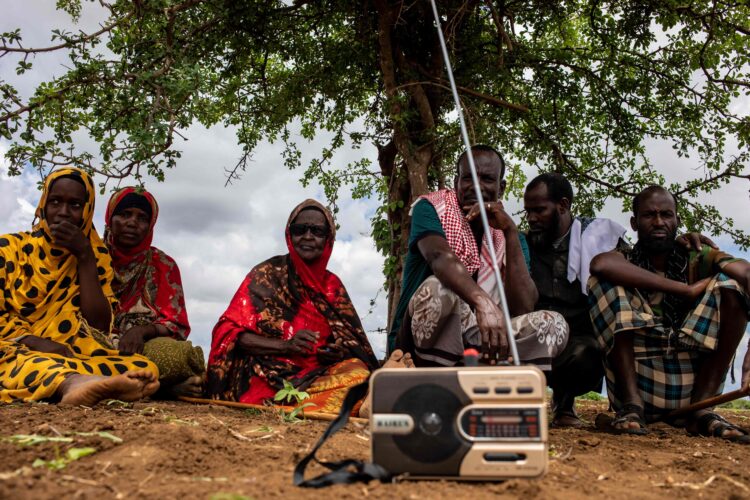WATCH: Rural radio: Listening to change (WRD 2025)
LISTEN: 80 ans de la FAO / Les radios rurales: des ondes qui rapprochent les communauté (in French)
As the world marks World Radio Day 2025 on 13 February under the theme Radio and Climate Change, it is worth reflecting on the fundamental role of radio in rural communication. Climate change is one of the greatest challenges of our time, disrupting food systems, natural resources, livelihoods and economies, particularly in rural areas. Farmers, fisherfolks, and pastoralists are on the front lines of these changes, needing timely and relevant information to adapt.
Communication for Development (ComDev) plays a crucial role in ensuring that communities can access adequate knowledge and media necessary to build resilience. “Since its creation in 1945, FAO’s focus has moved towards an integrated approach to development. This consistently applies to FAO’s current efforts to promote inclusive rural communication services”, stated Mario Acunzo, Head of the FAO Communication for Development Team.
Through regional ComDev initiatives and national projects, FAO is strengthening rural radio networks, ensuring that they provide locally relevant and actionable information. In countries including Somalia, FAO-supported radio programmes have informed farmers about sustainable agricultural practices, from soil conservation to livestock health practices adapted to climate change. The impact of these radio programmes has been tangible: increased resilience, improved yields, and better adaptation to climate shocks.
Thanks to the collaboration between rural radios and digital media, initiatives such as YenKasa Africa, ComDev Asia and Onda Rural in Latin America facilitate knowledge sharing, capacity development and awareness raising. Each region produces an online series of radio programmes to share climate-related content, agricultural best practices and critical information through rural radio networks.
Bridging the digital divide
Rural radio is evolving by integrating the use of mobile phones, SMS alerts and online streaming, which are increasing the reach and interactivity of radio programmes. Farmers can now call in with questions, participate in live discussions, and even receive personalized weather alerts. This participatory approach ensures that the information broadcast is connected to local realities.
However, in many rural regions, particularly in Africa and parts of Asia and Latin America, barriers such as illiteracy and the digital divide limit access to crucial information. Internet penetration remains uneven, and the high cost of smartphones and data services makes digital platforms inaccessible to many.
In this context, radio also serves to bridge the digital divide. While social media is often seen as an amplifier of radio content, the reverse is also true: radio translates and disseminates digital information in accessible formats, reaching rural populations that might otherwise be excluded from important discussions on climate adaptation, sustainable agriculture, and local governance. Radio – affordable, portable and requiring no literacy skills – continues to reach millions.
Reliable information with a far-stretching reach
As climate change accelerates, so does the need for trustworthy information. Extreme weather events – droughts, floods, hurricanes – threaten food production and livelihoods. Without access to credible information and responsive early warning systems, rural communities face heightened risks. Community radio stations, often run by farmer cooperatives, local NGOs or extension services, serve as vital hubs for climate communication in rural areas.
Empowering women and youth in radio broadcasting is another critical step. Community radio provides a crucial space for women to access information and speak up. Likewise, youth-led radio programmes are already shaping the debate on issues such as agroecology, renewable energy and sustainable farming.
As we celebrate World Radio Day 2025, it is clear that radio’s role in climate action is more important than ever. In response, FAO and its partners continue to champion inclusive rural communication services, ensuring that radio remains a trusted tool in the fight against climate change. From remote villages in Africa to coastal fishing communities in Asia, radio is not just a medium – it’s a lifeline, a classroom, and a catalyst for change.

